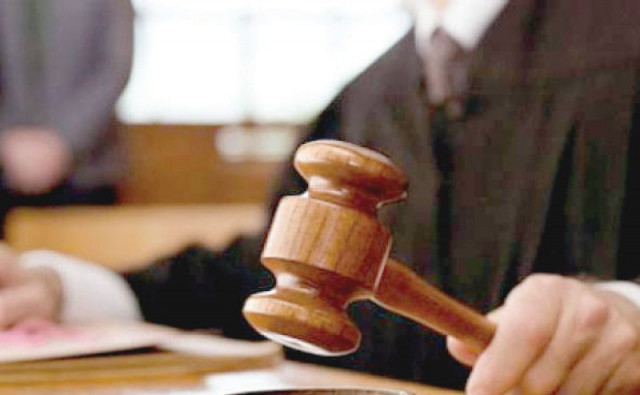Convictions’ timing raises eyebrows
Legal experts smell fishy in judgments coming in quick succession ahead of polls

PTI founding chairman Imran Khan has so far been convicted four times, but questions have been raised about the fairness of the trials, due process and timing of the judicial orders.
Imran has been convicted in three cases within five days -- namely cipher, Toshakhana (gift repository) and Iddat (a mandatory waiting period that a Muslim woman must observe on account of the death of her husband or dissolution of the marriage). His trials were conducted in jail expeditiously.
The purpose of speedy trials was to convict him before the next general elections scheduled for the 8th of the ongoing month. The timing of his convictions is interesting. Even PML-N supremo and former premier Nawaz Sharif was convicted in the Avenfield case just before the 2018 general elections.
Imran was earlier convicted in the Toshakhana case by an additional district and sessions judge on August 5 last year. After former chief justice of Pakistan Umar Ata Bandial’s retirement, it seems that all constitutional institutions, including the security establishment, are on the same page against the PTI, especially when it comes to Imran.
Lawyer Abdul Moiz Jaferii said anyone who had thought that what was happening with the PTI and Imran was about the law could now clearly admit their mistake.
"These have been three days of ridiculous atrocities committed in the name of law and justice. Each decision is more ridiculous than the last. To try and explain them in terms of law or within the frame of legality is to insult the intelligence of both the lawyer being asked and the public being answered to," he added.
Jaferii regretted that the most unfortunate aspect of the current situation was that it was the judicial system, which stood completely exposed as a weak and complicit tool in the greater design. “If the courts are going to be a circus, then all lawyers must realise they are playing the role of clowns.”
Senior lawyers believe that such convictions against political leaders cannot sustain in the long term. They say that these convictions can only gain a short-term objective. Now the next general elections were the main reason behind these expeditious trials.
It is also being witnessed that Nawaz’s convictions have been set aside after a few years. Earlier, judicial proceedings were manipulated against him before the 2018 general polls.
Read: Imran, Qureshi sentenced to 10-year imprisonment in cypher case
With his relationship with the 'powerful circles' restored, he has been successful in acquiring relief in those cases, which were initiated against him on the instructions of the apex court.
Currently, Imran’s relationship with 'powerful circles' is very tense. The PTI founding chairman is himself mainly responsible for narrowing his party's political space.
Instead of adopting new political options, Imran continued to offend the ‘powerful circles’ since his removal as the prime minister through a no-confidence motion under Article 95 of the Constitution.
Matters grew worse after last year’s May 9 mayhem. Instead of disassociating himself from the riots, Imran did not publicly condemn them. In all those events, once again the judiciary is the main loser as it was before the 2018 elections when Nawaz was the main target and he was convicted.
During the tenure of ex-CJP Bandial, it was being alleged that superior courts were facilitating the PTI and Imran. After his retirement, everything has completely changed.
Since the Jan 13 order that declared the PTI's internal elections as illegal, the party lost confidence in the judiciary to come to its rescue in the prevailing political situation. The PTI could not even retain its popular electoral symbol of the ‘cricket bat’ for the next polls.
The party leadership became further frustrated after the resignation of two pro-PTI judges in the Supreme Court -- Mazahar Ali Akbar Naqvi and Ijazul Ahsan.
The PTI withdrew its contempt petition against the caretaker Punjab government and Election Commission of Pakistan (ECP) over the violation of SC order to ensure a level playing field for its candidates in the next general polls.
After the SC's January 13 order, it has become difficult for the PTI to acquire relief from lower courts. The credibility of the general elections is at stake. The whole responsibility of the credibility of the elections has been shifted from the ECP to the top court after its January 13 order.
The dreams of many could not be fulfilled that the manipulation of judicial proceedings would come to an end during CJP Qazi Faez Isa's tenure.
Rights activists are criticising the Iddat case judgment wherein both Imran and his wife are convicted for seven years in jail. They believe that the verdict will have profound implications on women’s rights. It has been learnt that Imran’s legal team is going to challenge the three convictions in the Islamabad High Court.
Interestingly, Imran and his wife, Bushra Bibi, have already expressed their lack of trust in IHC Chief Justice Aamer Farooq.



















COMMENTS
Comments are moderated and generally will be posted if they are on-topic and not abusive.
For more information, please see our Comments FAQ